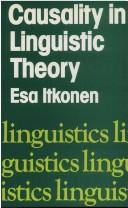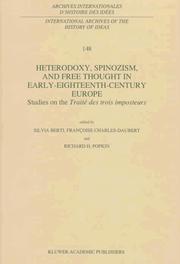| Listing 1 - 8 of 8 |
Sort by
|
Book
Year: 1876 Publisher: Paris : C. Reinuald,
Abstract | Keywords | Export | Availability | Bookmark
 Loading...
Loading...Choose an application
- Reference Manager
- EndNote
- RefWorks (Direct export to RefWorks)
Philosophy and religion. --- Rationalism. --- Rationalisme. --- rationalism (philosophy).
Book
ISBN: 9782503580227 250358022X Year: 2018 Publisher: Turnhout Brepols
Abstract | Keywords | Export | Availability | Bookmark
 Loading...
Loading...Choose an application
- Reference Manager
- EndNote
- RefWorks (Direct export to RefWorks)
Le présent livre 'VIII De phantaisia seu imaginatione se trouve dans la Physique du Syntagma', dans la partie qui concerne les êtres vivants ou animés, dont la rédaction se situe entre la moitié de 1644 et la fin de l?année suivante. Le livre est construit en six chapitres ; la thèse en est résumée à la fin du dernier. Dans l?ensemble, Gassendi articule de façon subtile des passages de doxographie et l?énoncé de sa propre position, qu?il désire situer par rapport à la tradition, procurant une démonstration à la fois historique et théorique. Le livre trouvant sa place à juste titre dans la Physique, c?est en naturaliste que Gassendi explore son objet : le rationalisme et le biologisme y trouvent une place essentielle. L?examen des doctrines antérieures auquel il se livre, comme il le fait presque systématiquement, ne prend en compte que celles qui envisagent l?imagination sous cet angle, excluant toute réflexion littéraire ou métaphysique sur l?imagination, 'folle du logis'. Il se montre très soucieux de mettre en place un vocabulaire précis, où la phantaisie est la notion majeure pour une réalité qu?il juge de la plus grande importance pour le fonctionnement cognitif et comportemental de l?homme et des animaux, soit le système psychologique.
Biologie. --- Biology. --- Einbildungskraft. --- Rationalism. --- Rationalisme. --- biology. --- rationalism (philosophy).
Book
ISBN: 9789056159740 Year: 2021 Publisher: Gorredijk Noordboek
Abstract | Keywords | Export | Availability | Bookmark
 Loading...
Loading...Choose an application
- Reference Manager
- EndNote
- RefWorks (Direct export to RefWorks)
Civilisation --- Political philosophy. Social philosophy --- humanism --- rationalism [philosophy]
Dissertation
Year: 1916 Publisher: Northfield, Minn. : [Press of the Northfield News],
Abstract | Keywords | Export | Availability | Bookmark
 Loading...
Loading...Choose an application
- Reference Manager
- EndNote
- RefWorks (Direct export to RefWorks)
Comets --- Comets. --- Comètes --- Rationalism. --- Rationalisme. --- Superstition. --- Superstitions. --- rationalism (philosophy). --- History --- Histoire --- 1600-1699.

ISBN: 0253313252 0709913133 9780253313256 9780709913139 Year: 1983 Publisher: London
Abstract | Keywords | Export | Availability | Bookmark
 Loading...
Loading...Choose an application
- Reference Manager
- EndNote
- RefWorks (Direct export to RefWorks)
The author seeks to examine the methodological and philosophical status of non-autonomous, that is, causal linguistics.
Causation --- Language and languages --- -Rationalism --- 800.1 --- Knowledge, Theory of --- Religion --- Belief and doubt --- Deism --- Free thought --- Realism --- Foreign languages --- Languages --- Anthropology --- Communication --- Ethnology --- Information theory --- Meaning (Psychology) --- Philology --- Linguistics --- Causality --- Cause and effect --- Effect and cause --- Final cause --- Beginning --- God --- Metaphysics --- Philosophy --- Necessity (Philosophy) --- Teleology --- Taalfilosofie --- Causation. --- Rationalism. --- Philosophy. --- 800.1 Taalfilosofie --- Philosophy of language --- Rationalism --- Causalidad. --- Causaliteit. --- Causality. --- Causalité. --- Langage et langues --- Linguistics. --- Racionalismo. --- Rationalisme. --- Taalfilosofie. --- rationalism (philosophy). --- Philosophie.
Book
ISBN: 9048193842 9786612995675 9048193850 1282995677 Year: 2011 Publisher: New York : Springer,
Abstract | Keywords | Export | Availability | Bookmark
 Loading...
Loading...Choose an application
- Reference Manager
- EndNote
- RefWorks (Direct export to RefWorks)
This volume draws a balanced picture of the Rationalists by bringing their intellectual contexts, sources and full range of interests into sharper focus, without neglecting their core commitment to the epistemological doctrine that earned them their traditional label. The collection of original essays addresses topics ranging from theodicy and early modern music theory to Spinoza’s anti-humanism, often critically revising important aspects of the received picture of the Rationalists. Another important contribution of the volume is that it brings out aspects of Rationalist philosophers and their legacies that are not ordinarily associated with them, such as the project of a Cartesian ethics. Finally, a strong emphasis is placed on the connection of the Rationalists’ philosophy to their interests in empirical science, to their engagement in the political life of their era, and to the religious background of many of their philosophical commitments.
Rationalism -- History. --- Rationalism -- Philosophy. --- Rationalists. --- Rationalists --- Philosophy & Religion --- Religion --- Rationalism --- Philosophy --- Philosophy. --- History. --- Philosophy of mind. --- Philosophy and science. --- Philosophy of nature. --- History of Philosophy. --- History of Science. --- Philosophy of Mind. --- Philosophy of Nature. --- Philosophy of Science. --- Philosophy (General). --- Science --- Nature --- Nature, Philosophy of --- Natural theology --- Mind, Philosophy of --- Mind, Theory of --- Theory of mind --- Cognitive science --- Metaphysics --- Philosophical anthropology --- Annals --- Auxiliary sciences of history --- Normal science --- Philosophy of science --- Science and philosophy --- Mental philosophy --- Humanities
Multi
ISBN: 9780521767071 9780521186827 052118682X 0521767075 9780511779664 9780511902208 0511902204 0511779666 1107209021 9781107209022 1282818511 9781282818514 9786612818516 6612818514 0511901410 9780511901416 0511900627 9780511900624 0511799055 9780511799051 0511797656 9780511797651 0511851413 Year: 2010 Publisher: Cambridge: Cambridge university press,
Abstract | Keywords | Export | Availability | Bookmark
 Loading...
Loading...Choose an application
- Reference Manager
- EndNote
- RefWorks (Direct export to RefWorks)
Inspired by the social theories of Max Weber, David d'Avray asks in what senses medieval religion was rational and, in doing so, proposes a new approach to the study of the medieval past. Applying ideas developed in his companion volume on Rationalities in History, he explores how values, instrumental calculation, legal formality and substantive rationality interact and the ways in which medieval beliefs were strengthened by their mutual connections, by experience, and by mental images. He sheds new light on key themes and figures in medieval religion ranging from conversion, miracles and the ideas of Bernard of Clairvaux to Trinitarianism, papal government and Francis of Assisi's charismatic authority. This book shows how values and instrumental calculation affect each other in practice and demonstrates the ways in which the application of social theory can be used to generate fresh empirical research as well as new interpretative insights.
Christian church history --- anno 500-1499 --- Church history --- Rationalism --- Values. --- Sociology. --- Eglise --- Rationalisme --- Valeurs (Philosophie) --- Sociologie --- Histoire --- Weber, Max, --- Religion --- --Rationalité --- --Moyen âge, --- Values --- Sociology --- Philosophy --- Axiology --- Worth --- Aesthetics --- Knowledge, Theory of --- Metaphysics --- Psychology --- Ethics --- Social theory --- Social sciences --- Belief and doubt --- Deism --- Free thought --- Realism --- Christianity --- Middle Ages, 600-1500 --- ウェーバー, マックス --- Philosophy. --- Weber, Max --- Ma-kʻo-ssu Wei-po, --- Makesi Weibo, --- Pebŏ, --- Pebŏ, Maksŭ, --- Vēbā, Makkusu, --- Veber, Maks, --- Vemper, Max, --- Webŏ, Maksŭ, --- Wei-po, Ma-kʻo-ssu, --- Weibo, --- Weibo, Makesi, --- ובר, מאקס, --- ובר, מאכס --- ובר, מקס --- 韦伯, --- Arts and Humanities --- History --- Rationalité --- Moyen âge, 476-1492 --- Church history - Middle Ages, 600-1500 --- Rationalism - Philosophy --- Weber, Max, - 1864-1920

ISBN: 0792341929 9048147417 9401587353 9780792341925 Year: 1996 Volume: 148 Publisher: Dordrecht: Kluwer,
Abstract | Keywords | Export | Availability | Bookmark
 Loading...
Loading...Choose an application
- Reference Manager
- EndNote
- RefWorks (Direct export to RefWorks)
Atheism --- Irreligion --- Philosophy, Modern --- Philosophy and religion --- Rationalism --- Athéisme --- Irréligion --- Philosophie --- Philosophie et religion --- Rationalisme --- History --- Histoire --- Spinoza, Benedictus de, --- De tribus impostoribus --- Knowledge, Theory of --- Religion --- Belief and doubt --- Deism --- Free thought --- Realism --- Spinoza, Benedictus de --- rationalism [philosophy] --- Philosophy --- Athéisme --- Irréligion --- Ispīnūzā, --- Spinoza, Baruch, --- Espinoza, Baruch d', --- Sbīnūzā, --- Espinosa, Baruch de, --- De Spinoza, Benedictus, --- Shpinozah, --- Shpinozah, Barukh, --- Spinoza, Benedict de, --- Spinoza, Barukh, --- Spinoza, Baruch de, --- Spinoza, Benoît de, --- ספינאזא, ברוך דע --- ספינאזא, ברוך, --- שפימוזה, ברוך --- שפינאזא, בענעדיקט --- שפינאזא, ברוך --- שפינאזע, ברוך --- שפינוזא, בנדיקטוס --- שפינוזהת ברוך, --- שפינוזה, ברוך --- שפינוזה, ברוך די, --- שפינוזה, ברוך, --- שפינוזה, ב. --- سبينوزا، بندكتس --- De tribus impostoribus. --- Traité des trois imposteurs, ou l'Esprit de M. Spinosa --- Congresses --- 18th century --- Influence --- Dissenters [Religious ] --- de Spinoza, Benedictus --- Spinoza, Baruch --- Spinoza, Benedict de --- Libre pensee --- Spinozisme
| Listing 1 - 8 of 8 |
Sort by
|

 Search
Search Feedback
Feedback About UniCat
About UniCat  Help
Help News
News